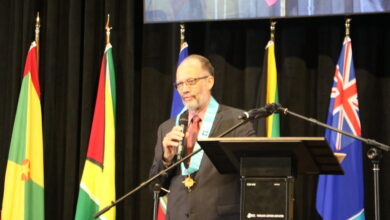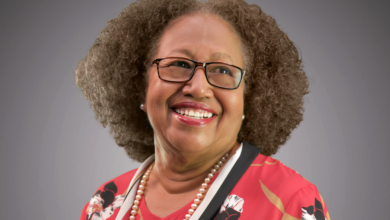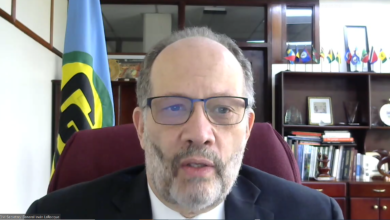(CARICOM Secretariat, Turkeyen, Greater Georgetown, Guyana ) It is my distinct pleasure to address you at the Opening of this Twenty-Fourth Session of the Caribbean Development and Cooperation Committee (CDCC). Let me first express my appreciation to Ms Alicia Barcena, Executive Secretary of the Economic Commission for Latin America and the Caribbean (ECLAC) for inviting me to share this occasion with you. She and I had a very productive dialogue soon after I assumed office and I look forward to working with her in the interest of the Region.
This Committee is meeting at a time when, more than ever, the Caribbean needs to consider new and innovative approaches to generating economic growth and transformation. I am, therefore, particularly pleased about the establishment of the Caribbean Development Roundtable which had its Second Meeting yesterday in order to address issues related to Macro-Economic Policy for Structural Transformation and Social Protection in Small States. The achievement and maintenance of macro-economic stability are critical to stimulating the growth process and for providing the right signals to influence economic actors. I therefore look forward to the Report from the Roundtable.
Given their inherent vulnerabilities, CARICOM States continue to be significantly impacted by external developments, particularly the volatility of international prices of commodities, and uncertainties in international financial markets, and the possibility of another global recession occasioned by the Eurozone crisis. When associated with our susceptibility to the ravages of natural disasters, Members of our Community have limited capacity to make the adjustments necessary to reduce their economic vulnerability. As such, the macroeconomic policy framework is probably the major tool available to CARICOM States to reduce vulnerability and build economic resilience over time.
Building economic resilience and sustainable economic development in CARICOM States requires concerted efforts towards maintaining economic stability and ensuring market efficiency in order to provide the conditions required for economic transformation and global competitiveness. Such a resilience-building strategy requires cooperation and collaboration at many levels – among CARICOM Member States within the context of the CARICOM Single Market and Economy; with the multilateral financial community and development partners; as well as with institutions like ECLAC, which share similar objectives with the Caribbean Community.
Of course, it is important that any framework for economic stability and growth should also address social protection policies for the poor and vulnerable groups in our society. We are ever conscious that the sustained economic growth and competitiveness which we seek will only result if we pay simultaneous attention to the social and environmental aspects of our development. Any strategy for regional development will be successful only to the extent that it promotes and ensures coherence and synergies among these mutually reinforcing dimensions.
Over the years, the Region has made significant strides in the areas of education and health, two important pillars of human resource development which are critical for the reduction of poverty. In the global economy, characterised and driven by the knowledge society and innovation, economic development is increasingly linked to the pace at which appropriate technical knowledge and skills are acquired. Education then, is not merely an input to our economies but lies at the very heart of our competitiveness. The Region is faced with the task of ensuring congruence between education systems and the skills and attitudes necessary for competitiveness, and simultaneously with issues of equity. The continuous recalibration of our education systems which is required, demands retooling at all levels and, importantly, our ability to analyse and assess the effectiveness of our efforts.
Over the years, the CARICOM Secretariat and ECLAC have cooperated and collaborated on many levels. We share similar views on the importance of regional integration to the sustainable development of CARICOM States. We agree on the importance of crafting and applying appropriate measurements of social and economic development as a guide to effective policymaking. Hence, the emphasis on generating appropriate economic and social statistics which take into account the peculiar characteristics of small, open States seeking to overcome economic vulnerability and build resilience. Our collaboration in respect of sustainable development initiatives has been focussed on the impact of climate change on our social and economic sectors which has assisted our Member States in their participation in the ongoing international dialogue on the issue.
We need to take this collaboration and co-operation to a higher level, one that is based on a determined programme of activities that will address the peculiar needs of our Region. Essential for going forward, in that regard, would be enhancing the resources available to the ECLAC Sub-regional Office in Trinidad and Tobago for it to be better able to assist in finding solutions to the perennial social and economic problems of our Region, as stated in the recent evaluation of ECLAC’s role in the Caribbean. Such actions would assist the CARICOM Secretariat and ECLAC to enhance the delivery of initiatives beneficial to the sustainable development of our Community.
This would be the most effective use of the shrinking development resources which both the CARICOM Secretariat and ECLAC rely on to roll-out their plans and programmes. No doubt, the Report from the Second Caribbean Development Roundtable as well as the outcome of today’s deliberations of this Committee will provide many ideas on the content of this programme.
I wish you every success in your deliberations.
I thank you.




